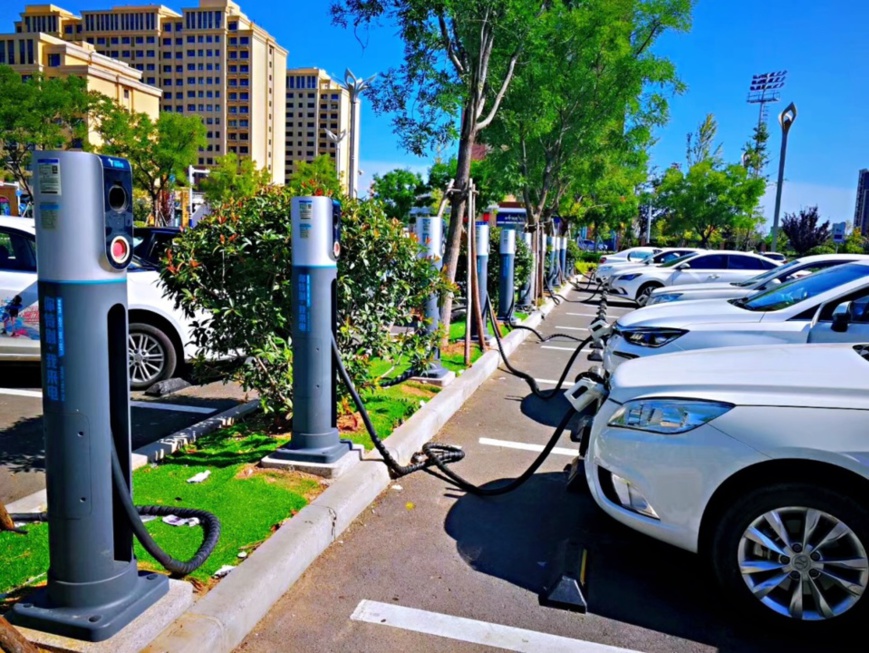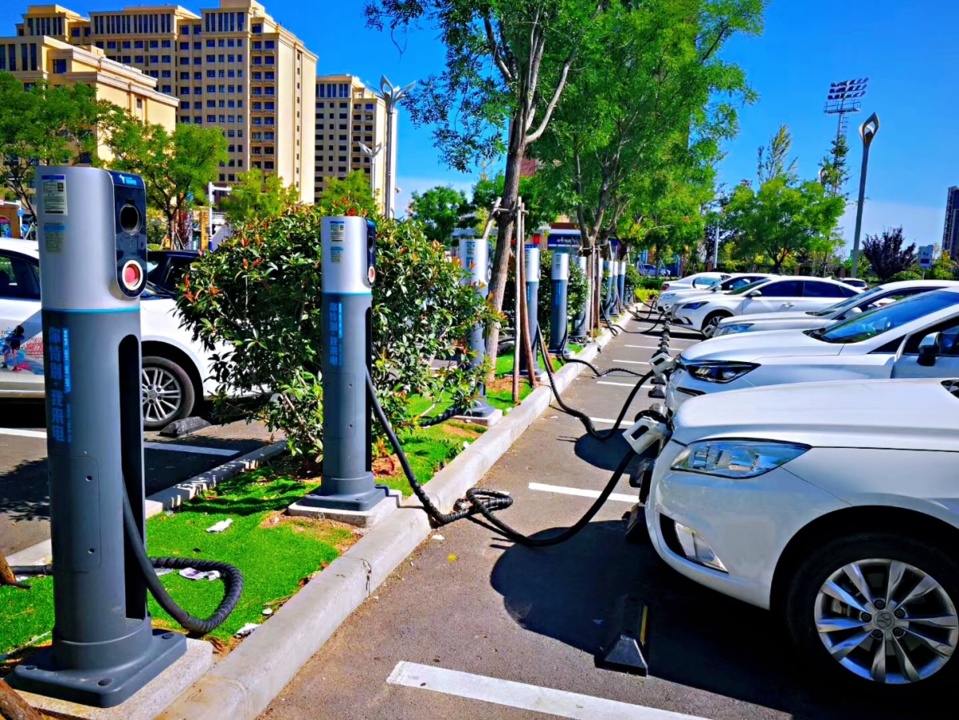By Pan Junqiang, People’s Daily

New energy vehicles are being charged at a charging station in Qingdao, east China’s Shandong Province. Photo provided by TELD Shandong branch
As one of the first batch of pilot cities for new energy vehicle (NEV) application, Qingdao, east China’s Shandong Province is seeing rapid growth of the number of NEVs and charging facilities since 2013.
Li Ting is a civil servant working in the city’s West Coast New Area who used to commute between his office and home by a gasoline-fueled vehicle. Now, with improved ecology for NEVs, Li has turned into a big fan of electric cars.
After the Spring Festival of 2019, Li bought a two-seat electric car and received a green plate - one that is exclusive for NEVs. Now he drives the new car to work every day.
“The car is small and flexible, so it is easy to make U-turns and park. That’s why I bought it,” Li explained, saying the NEV makes less noise and has a quick launch.
What’s more, over 50 charging poles have been deployed beside Li’s office building thanks to Qingdao’s efforts to improve infrastructure for electric vehicles. According to Li, who drives around 30 kilometers per day commuting between offices and home, a full charge enables week-long driving.
Zhou Dachuan, general manager of an NEV project of SAIC-GM-Wuling Automobile in Qingdao, said he once installed charging poles at 10 parking spaces he rented in a residential complex in the West Coast New Area, and soon many residents there bought their NEVs.
“The people actually need electric vehicles, and the convenient charging facilities helped us sell our cars, ” Zhou said.
To have a more reasonable distribution of charging infrastructure across the city, Qingdao had a thorough investigation of people’s need in different parts of the city, and launched an online platform which makes drivers find charging poles more easily.
At present, 8 new energy companies have registered in Qingdao and started constructing and operating charging facilities, including the State Grid Electric Vehicle Service Company Shandong branch and TELD, the operator of China’s largest charging network.
“To build charging infrastructure, the builders must take the layout and users’ accessibility into consideration,” said Ding Wei, general manager of TELD’s Qingdao branch, adding that the charging speed is also an important factor.
So far, Qingdao has completed 1,122 charging stations, and 30 more are under construction. It has over 17,300 charging poles, or 3.5 for each electric vehicle. Charging stations in downtown Qingdao are built at an interval of less than 2 kilometers, and those in central area are built at an interval of less than 1 kilometer.
“We have built smart charging poles and developed a mobile application, so that the poles and users' phones are connected,” Ding introduced. Users can search for the nearest charging stations on the application, he said.
Experts noted that to boost NEV sales, improved infrastructure alone is not enough, and relevant R&D is also needed to extend the range of electric cars.
Li Ting is a civil servant working in the city’s West Coast New Area who used to commute between his office and home by a gasoline-fueled vehicle. Now, with improved ecology for NEVs, Li has turned into a big fan of electric cars.
After the Spring Festival of 2019, Li bought a two-seat electric car and received a green plate - one that is exclusive for NEVs. Now he drives the new car to work every day.
“The car is small and flexible, so it is easy to make U-turns and park. That’s why I bought it,” Li explained, saying the NEV makes less noise and has a quick launch.
What’s more, over 50 charging poles have been deployed beside Li’s office building thanks to Qingdao’s efforts to improve infrastructure for electric vehicles. According to Li, who drives around 30 kilometers per day commuting between offices and home, a full charge enables week-long driving.
Zhou Dachuan, general manager of an NEV project of SAIC-GM-Wuling Automobile in Qingdao, said he once installed charging poles at 10 parking spaces he rented in a residential complex in the West Coast New Area, and soon many residents there bought their NEVs.
“The people actually need electric vehicles, and the convenient charging facilities helped us sell our cars, ” Zhou said.
To have a more reasonable distribution of charging infrastructure across the city, Qingdao had a thorough investigation of people’s need in different parts of the city, and launched an online platform which makes drivers find charging poles more easily.
At present, 8 new energy companies have registered in Qingdao and started constructing and operating charging facilities, including the State Grid Electric Vehicle Service Company Shandong branch and TELD, the operator of China’s largest charging network.
“To build charging infrastructure, the builders must take the layout and users’ accessibility into consideration,” said Ding Wei, general manager of TELD’s Qingdao branch, adding that the charging speed is also an important factor.
So far, Qingdao has completed 1,122 charging stations, and 30 more are under construction. It has over 17,300 charging poles, or 3.5 for each electric vehicle. Charging stations in downtown Qingdao are built at an interval of less than 2 kilometers, and those in central area are built at an interval of less than 1 kilometer.
“We have built smart charging poles and developed a mobile application, so that the poles and users' phones are connected,” Ding introduced. Users can search for the nearest charging stations on the application, he said.
Experts noted that to boost NEV sales, improved infrastructure alone is not enough, and relevant R&D is also needed to extend the range of electric cars.
 Menu
Menu
 Qingdao sees improved infrastructure for NEVs
Qingdao sees improved infrastructure for NEVs
















